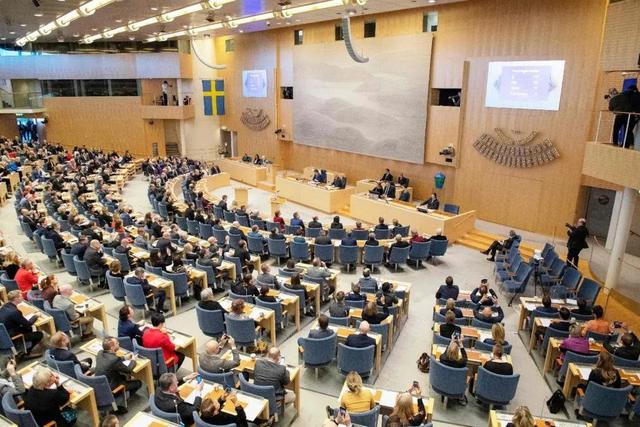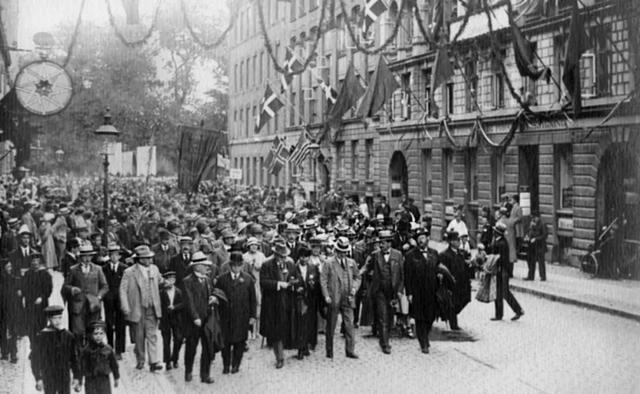【往期回顾】
【本期内容】
How Sweden became one of the world’s most stable democracies
瑞典是如何成为世界上最稳定的民主国家之一的

When democratisation in developing countries is discussed, the focus is often on the right to vote and how the government’s power stems from an elected parliament. However, even if these criteria are fulfilled, it is not unusual that elections are marked by fraud and corruption, something that democracies in the western world are not slow to point out.
当讨论发展中国家的民主化时,重点往往是投票权以及政府的权力如何来自民选议会。然而,即使满足了这些标准,选举中以欺诈和腐败为特征的情况也并不罕见,西方世界的民主国家也迅速指出了这一点。
“Even though we criticise election fraud in less developed countries, we don’t really know very much about what has happened here historically and why we have succeeded in having free and fair elections. My study is about gaining a better understanding of our own development”, says Professor of Political Science Jan Teorell.
政治学教授简·特奥雷尔说:“尽管我们批评欠发达国家的选举舞弊,但我们对这里历史上发生的事情以及为什么我们成功地举行了自由公正的选举并不了解。我的研究是为了更好地了解我们自己的发展”。

Sweden also happens to be a particularly interesting example, considers Teorell, as fair elections could be conducted right from the introduction of democracy in the early 1900s. Furthermore, it is an easy country to study, as there are good archives available going back hundreds of years.
特奥雷尔认为,瑞典恰好也是一个特别有趣的例子,因为公平的选举可以从20世纪初引入民主开始进行。此外,它是一个易于研究的国家,因为有数百年前的良好档案。
The study focuses on the years between 1719, at the start of the Age of Liberty when the royal autocracy was temporarily abolished, and 1908, when the last election was held before proportional representation was introduced in Sweden. A total of 54 parliamentary elections were held during this period. All of these were followed by a greater or lesser number of petitions from citizens who claimed that the election had not been conducted properly.
这项研究的重点是1719年,即自由时代开始时,皇家专制制度被暂时废除,以及1908年,即瑞典引入比例代表制之前举行的最后一次选举。在此期间,共举行了54次议会选举。所有这些之后,或多或少都有公民请愿,声称选举没有正确进行。
Political science research usually points to four important factors that prevent election fraud:
政治学研究通常指出防止选举舞弊的四个重要因素:
lSecret ballots(无记名投票)
lThe election system – proportional representation elections present less risk of electoral fraud than majority elections in single-member constituencies.(与单一成员选区的多数选举相比,比例代表制选举的选举舞弊风险较小。)
lEconomic welfare – it is easier to bribe the poor than the rich.(经济福利——贿赂穷人比贿赂富人更容易。)
lLand reforms – power concentrated among a few landowners is considered to pave the way for corruption.(土地改革——权力集中在少数土地所有者手中被认为为腐败铺平了道路。)

However, none of the factors above apply to the Swedish case, according to Jan Teorell. Instead, it is the professionalisation of the bureaucracy and the power of the political parties that influenced election fraud – but in completely different ways. Professional bureaucrats, appointed on merit rather than on political grounds, counteract election fraud. Strong political parties influence elections in the entirely opposite direction.
然而,简·特奥雷尔表示,上述因素均不适用于瑞典的情况。相反,是官僚机构的专业化和政党的权力影响了选举舞弊,但方式完全不同。专业官僚根据功绩而非政治理由任命,以抵制选举舞弊。强大的政党对选举的影响完全相反。
“When parties compete for power there is a lot more at stake, because the parties are better at organising different interests from other parts of the country, and the election battle becomes more ideological”, says Jan Teorell.
简·特奥雷尔说:“当政党争夺权力时,利害关系会更大,因为政党更善于组织来自全国其他地区的不同利益,选举战也变得更加意识形态化。”。
During the Age of Liberty the parties were supported by foreign gold, which was divided up among the successfully elected members of parliament, creating an extra incentive to use improper methods to win an election. Fraud affected aspects such as the electoral register, vote counting and the declaration of a winner – in some cases, corrupt mayors decided to send themselves to parliament, even though they had not actually received most votes.
在自由时代,政党得到了外国黄金的支持,这些黄金被成功当选的议员瓜分,这为使用不正当方法赢得选举创造了额外的动力。欺诈影响了选民登记、计票和宣布获胜者等方面——在某些情况下,腐败的市长决定将自己送到议会,即使他们实际上并没有获得大多数选票。
Electoral fraud culminated toward the end of the Age of Liberty, at the election of 1771. At that time the political parties – the Hats and Caps – had grown strong, whereas the bureaucracy had not yet become professionalised.
选举舞弊在1771年的选举中达到了自由时代末期的顶峰。当时,政党——礼帽党和便帽党——已经变得强大,而官僚机构尚未实现专业化。
The next spike in election fraud petitions can be seen in the years around the introduction of the two-chamber parliament in 1866. The political parties were still strong during this period, but in contrast to 1771 the Swedish bureaucracy was now a professional organisation.
选举舞弊请愿的下一次激增可以在1866年两院议会成立前后的几年里看到。在此期间,政党仍然很强大,但与1771年相比,瑞典官僚机构现在是一个专业组织。
“The petitions concerning election fraud were quite different to those of 1771. This time it was more about misunderstandings and ambiguities concerning how an election should be conducted, rather than deliberate corruption to buy your way to power.”
“关于选举舞弊的请愿书与1771年的请愿书大不相同。这一次,更多的是关于如何进行选举的误解和含糊不清,而不是故意腐败以换取权力。”

Does this affect the way you see political parties’ role in democracy?
这会影响你对政党在民主中的作用的看法吗?
“The parties, of course, are an important part of democracy. Without them democracy cannot function. But the results emphasise how important it is to make bureaucratic reforms in developing countries if you want to address the problem of election fraud.”
“当然,政党是民主的重要组成部分。没有政党,民主就无法运作。但结果强调,如果你想解决选举舞弊问题,在发展中国家进行官僚改革是多么重要。”
What about election fraud in present-day Sweden?
当今瑞典的选举舞弊情况如何?
“It is not a widespread problem here, but in the 2010 election there were a record number of appeals concerning ballots, and two ballots even had to be rerun. However, once again the problem mainly concerned neglect rather than an intentional attempt to cheat. One exception is possibly the “election school” set up by the Social Democratic Party close to an early voting station in Örebro Municipality – the municipal election had to be rerun because of it.”
“这在这里不是一个普遍的问题,但在2010年的选举中,有关选票的上诉数量创下历史新高,甚至有两张选票不得不重新进行。然而,问题再次主要涉及忽视,而不是故意作弊。一个例外可能是社会民主党在厄勒布鲁市一个提前投票站附近设立的“选举学校”——因此,市政选举不得不重新举行。”
“In Sweden we have long strived to make it as easy as possible to vote, which among other things has resulted in a large number of early voting stations in public places such as squares and shopping centres. The risks entailed when the ballot papers are then sent in for processing have probably been underestimated, but I do not know of a study about the appeals following the 2014 election.”
“在瑞典,我们长期以来一直努力使投票变得尽可能容易,这导致广场和购物中心等公共场所出现了大量提前投票站。然后将选票送去处理所带来的风险可能被低估了,但我不知道有关于2014年大选后上诉的研究。”

【Source】www.lunduniversity.lu.se
【Translated by】Spark Liao (廖怀宝)
【Illustration】From Bing
